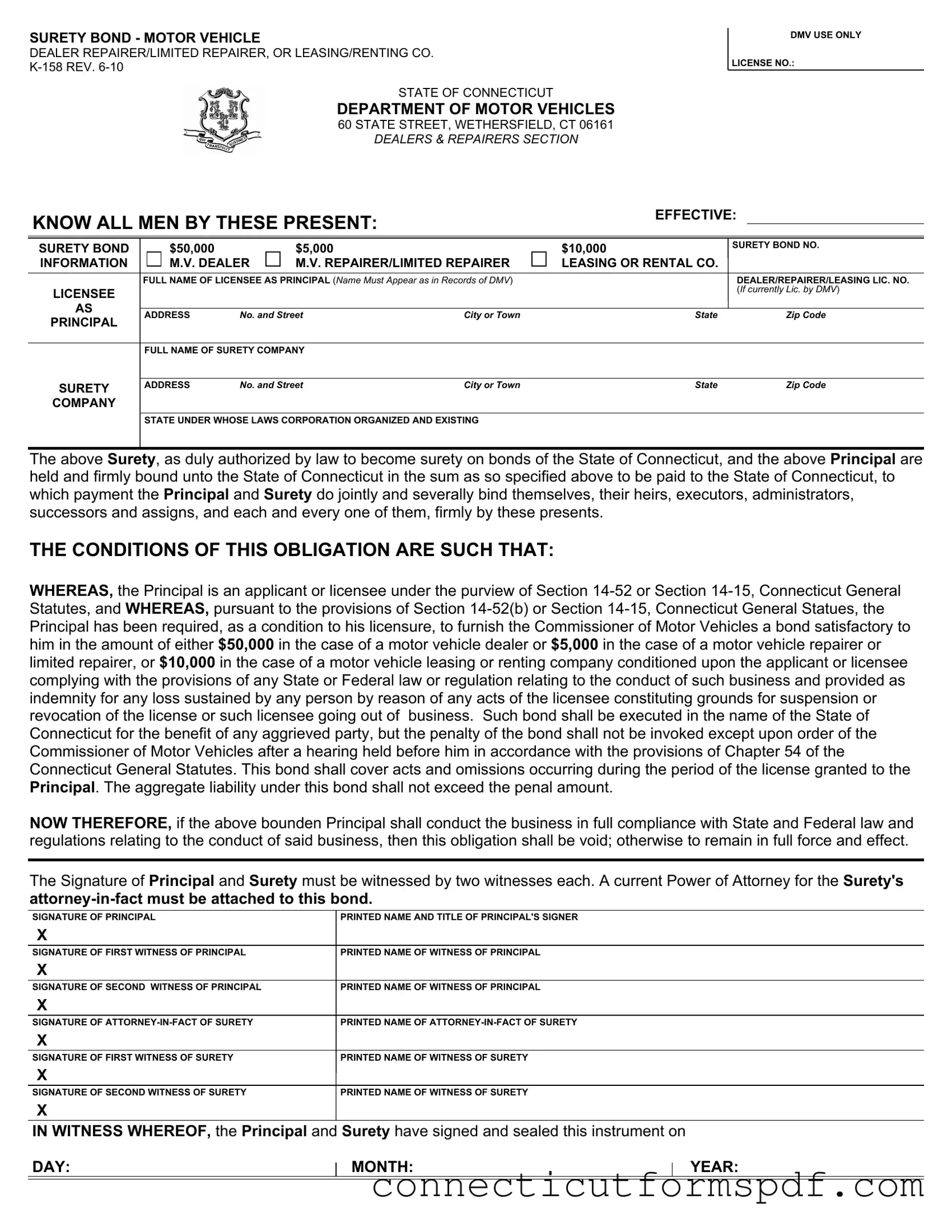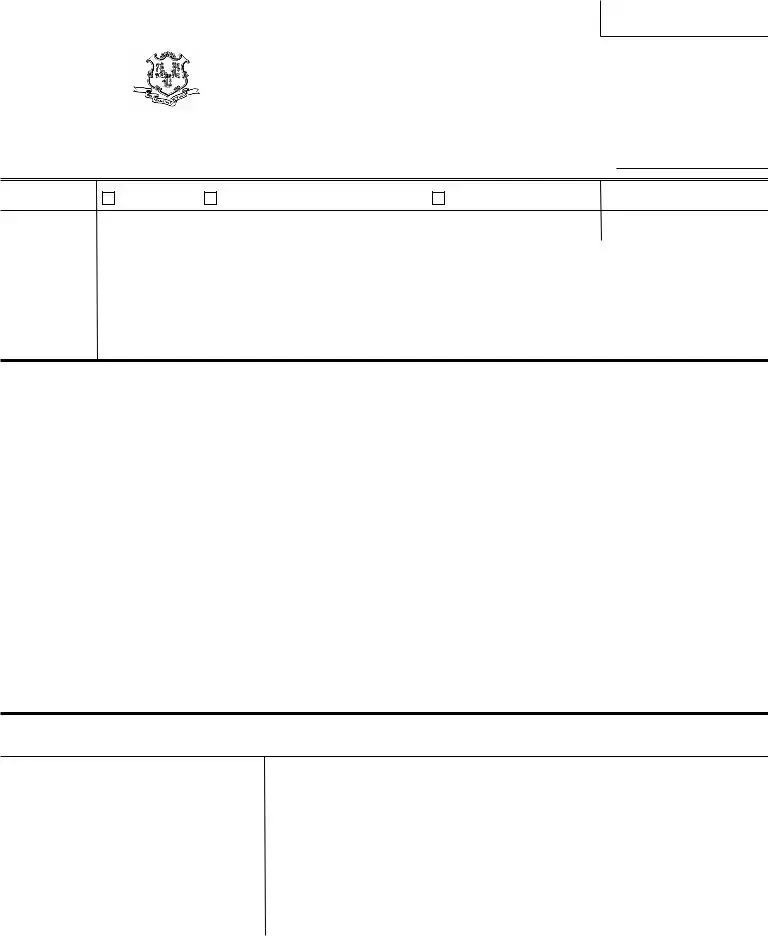SURETY BOND - MOTOR VEHICLE
DEALER REPAIRER/LIMITED REPAIRER, OR LEASING/RENTING CO.
K-158 REV. 6-10
STATE OF CONNECTICUT
DEPARTMENT OF MOTOR VEHICLES
DMV USE ONLY
LICENSE NO.:
60 STATE STREET, WETHERSFIELD, CT 06161
DEALERS & REPAIRERS SECTION
KNOW ALL MEN BY THESE PRESENT: |
EFFECTIVE: |
|
$5,000
M.V. REPAIRER/LIMITED REPAIRER
$10,000 |
SURETY BOND NO. |
|
LEASING OR RENTAL CO. |
|
|
|
FULL NAME OF LICENSEE AS PRINCIPAL (Name Must Appear as in Records of DMV) |
|
DEALER/REPAIRER/LEASING LIC. NO. |
|
LICENSEE |
|
|
|
|
(If currently Lic. by DMV) |
|
|
|
|
|
|
|
AS |
|
|
|
|
|
|
ADDRESS |
No. and Street |
City or Town |
State |
Zip Code |
|
PRINCIPAL |
|
|
|
|
|
|
|
|
|
|
|
|
|
|
FULL NAME OF SURETY COMPANY |
|
|
|
|
|
|
|
|
|
|
|
SURETY |
ADDRESS |
No. and Street |
City or Town |
State |
Zip Code |
|
|
|
|
|
|
|
COMPANY |
|
|
|
|
|
|
|
|
|
|
|
|
STATE UNDER WHOSE LAWS CORPORATION ORGANIZED AND EXISTING |
|
|
The above Surety, as duly authorized by law to become surety on bonds of the State of Connecticut, and the above Principal are held and firmly bound unto the State of Connecticut in the sum as so specified above to be paid to the State of Connecticut, to which payment the Principal and Surety do jointly and severally bind themselves, their heirs, executors, administrators, successors and assigns, and each and every one of them, firmly by these presents.
THE CONDITIONS OF THIS OBLIGATION ARE SUCH THAT:
WHEREAS, the Principal is an applicant or licensee under the purview of Section 14-52 or Section 14-15, Connecticut General Statutes, and WHEREAS, pursuant to the provisions of Section 14-52(b) or Section 14-15, Connecticut General Statues, the Principal has been required, as a condition to his licensure, to furnish the Commissioner of Motor Vehicles a bond satisfactory to him in the amount of either $50,000 in the case of a motor vehicle dealer or $5,000 in the case of a motor vehicle repairer or limited repairer, or $10,000 in the case of a motor vehicle leasing or renting company conditioned upon the applicant or licensee complying with the provisions of any State or Federal law or regulation relating to the conduct of such business and provided as indemnity for any loss sustained by any person by reason of any acts of the licensee constituting grounds for suspension or revocation of the license or such licensee going out of business. Such bond shall be executed in the name of the State of Connecticut for the benefit of any aggrieved party, but the penalty of the bond shall not be invoked except upon order of the Commissioner of Motor Vehicles after a hearing held before him in accordance with the provisions of Chapter 54 of the Connecticut General Statutes. This bond shall cover acts and omissions occurring during the period of the license granted to the Principal. The aggregate liability under this bond shall not exceed the penal amount.
NOW THEREFORE, if the above bounden Principal shall conduct the business in full compliance with State and Federal law and regulations relating to the conduct of said business, then this obligation shall be void; otherwise to remain in full force and effect.
The Signature of Principal and Surety must be witnessed by two witnesses each. A current Power of Attorney for the Surety's attorney-in-fact must be attached to this bond.
SIGNATURE OF PRINCIPAL |
|
PRINTED NAME AND TITLE OF PRINCIPAL'S SIGNER |
|
X |
|
|
|
|
|
SIGNATURE OF FIRST WITNESS OF PRINCIPAL |
|
PRINTED NAME OF WITNESS OF PRINCIPAL |
|
X |
|
|
|
|
|
SIGNATURE OF SECOND WITNESS OF PRINCIPAL |
|
PRINTED NAME OF WITNESS OF PRINCIPAL |
|
X |
|
|
|
|
|
SIGNATURE OF ATTORNEY-IN-FACT OF SURETY |
|
PRINTED NAME OF ATTORNEY-IN-FACT OF SURETY |
|
X |
|
|
|
|
|
SIGNATURE OF FIRST WITNESS OF SURETY |
|
PRINTED NAME OF WITNESS OF SURETY |
|
X |
|
|
|
|
|
SIGNATURE OF SECOND WITNESS OF SURETY |
|
PRINTED NAME OF WITNESS OF SURETY |
|
X |
|
|
|
|
|
IN WITNESS WHEREOF, the Principal and Surety have signed and sealed this instrument on |
|
DAY: |
|
MONTH: |
|
|
YEAR: |
|
|
|
|
|
|
|
|


